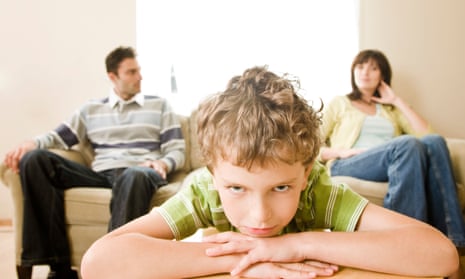Parental separation is more likely to harm the mental health of children if they are aged at least seven when the split occurs, but appears to have no effect on the risks of them getting ill if they are younger, research has found.
The research, involving 6,245 children and young people in the UK, is the first British study to explore the links between couple separation or divorce and the impact on the mental wellbeing of children. Family break-up was already known to be one of several childhood experiences that can lead to young people developing mental health problems such as anxiety and depression.
Minors aged between seven and 14 at the time of the split exhibit a 16% rise in emotional problems, such as anxiety and depressive symptoms, and an 8% increase in conduct disorders.
In contrast, children whose parents separate when they are between three and seven are not more likely to develop such problems either immediately or by the age of 14 than those still living with both parents.
Prof Emla Fitzsimons, of the Institute of Education at University College London and co-author of the study, said: “Family splits occurring in late, but not early, childhood are detrimental to adolescent mental health. One possible reason for this is that children are more sensitive to relationship dynamics at this age.”
Fitzsimons and her colleague, Aase Villadse, analysed 6,245 children involved in the Millennium Cohort Study, which is tracking the health of young people born at the start of the century.
“We find that paternal departure has a negative effect on child mental health, particularly on internalising symptoms. There are no short-term effects of departure in early childhood, and only weak evidence of medium-term effects, and for females only,” reads the research paper, which was published on Thursday in the journal Social Science and Medicine. “Paternal departure in later childhood, on the other hand, is associated with an increase in internalising problems in both males and females.”
However, among seven- to 14-year-olds, boys were more likely to display behavioural problems, such as acting up and being disobedient.
The researchers found no class divide in the effects of family break-up; those from poorer and wealthier backgrounds were equally likely to experience mental ill-health.
Tom Madders, the campaigns director at the charity YoungMinds, said: “The reasons why a young person may develop mental health problems can be complex, but this study shows how family break-ups can be confusing and disruptive for a child and play a significant part, particularly in later childhood. That’s why it’s so important to build children’s resilience from a young age, and teach them to learn about healthy relationships, both with others and themselves.”
Dr Nick Waggett, chief executive of the Association of Child Psychotherapists, said parents who split up may be too consumed by their separation to give their children enough emotional support, leading to them developing problems. “Late childhood and early adolescence involves the child needing to have a growing sense of their own identity and individuality, distinct from that of their elders, and needing robust parents who are emotionally available to them at this period of transition.
“It may be that parents who are occupied with issues of separation as a couple at the point the child moves into adolescence are less able to provide the emotional support that the child needs to negotiate their own process of separation and development towards adulthood.”
